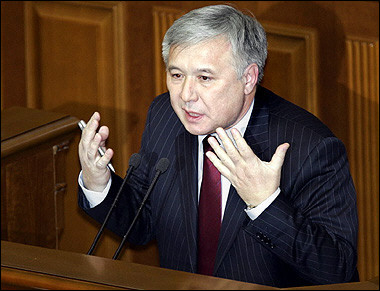|
Ukraine parliament sacks government over Russia gas deal
(AFP)
Updated: 2006-01-11 10:14
Ukraine's parliament voted to sack the government over a controversial deal
to resolve the country's energy crisis following a damaging dispute with Russia
that sent a shudder through energy-reliant Europe.
Lawmakers passed a resolution of no confidence in the government of Prime
Minister Yury Yekhanurov with 250 votes in favour, well over the 226 needed for
it to pass.
"We should defend the interests of Ukraine. We should defend the Ukrainian
people," said Nestor Shufrich, one of the deputies opposed to last week's deal
ending a "gas war" with Russian energy giant Gazprom.
While the resolution takes immediate effect, the lawmakers also ordered that
ministers stay on in a caretaker capacity until a new government can be formed.
Analysts were doubtful that would happen before parliamentary elections that
are scheduled for March 26.

Ukrainian Prime Minister Yury Yekhanurov
speaks at the parliament in Kiev, to defend his government's recent deal
with Russia on gas prices, telling an angry parliament that it served
Ukraine's national interests and promising that it would not lead to
higher prices for consumers anytime
soon.[AFP] | But the vote is a blow to the
leadership of President Viktor Yushchenko.
The cabinet had been expected to weather a torrent of criticism of last
week's gas deal, which resolved a crisis that briefly disrupted supplies to
several European countries for which Ukraine is the main transit route.
In the event, the no-confidence resolution drew support from diverse
political groups.
Votes in favour came from blocs led both by Yulia Tymoshenko -- a key figure
who stood side-by-side with Yushchenko in the 2004 "orange revolution" -- and
from Viktor Yanukovich, whose pro-Moscow leadership the revolution was aimed at.
Arriving on a visit to the Kazakh capital Astana, Yushchenko slammed the move
and said he would challenge it before the Constitutional Court.
"Time will show that this decision is not constitutional," said Yushchenko,
who was scheduled to attend the inauguration Wednesday of Kazakh President
Nursultan Nazarbayev.
Yushchenko has been struggling to live up to the hopes raised by the 2004
"orange" protests at which he promised a radical shift away from Moscow and
towards the West.
His team last year made heavy work of promised liberalisation, while
Yushchenko also fell out with the charismatic Tymoshenko, whom he sacked as
prime minister in September.
His goals of hoped-for European Union and NATO membership will hang in the
balance at the March 26 polls, analysts say.
At Tuesday's session, Yekhanurov defended the deal with Russia on gas prices,
telling parliament that it served Ukraine's interests and promising that
consumers would not face price hikes any time soon.
"In its actions, the government was guided and will continue to be guided by
the national interests of Ukraine," Yekhanurov said.
Ukraine will pay a "far lower" price for gas than other eastern European
countries, he said, adding that "gas prices for the population will remain at
their current level" for the time being.
European politicians breathed a sigh of relief when Ukraine clinched last
week's agreement.
Under the terms of the accord, Ukraine agreed to buy natural gas from both
Russia and Turkmenistan through an intermediary company at a rate of 95 dollars
per 1,000 cubic meters.
Thanks to the low prices of supplies from Turkmenistan that is well below the
230 dollars Gazprom has demanded for Russian gas.
But opponents were angered that the deal still represented a substantial rise
on last year's price of 50 dollars per 1,000 cubic metres.
Some criticised the fact that all supplies to Ukraine will be handled by a
single intermediary, RosUkrEnergo, a commercial enterprise owned by Gazprom and
an Austrian bank.
Thursday's parliament vote is likely to weaken Yushchenko, although it is
unlikely that the ambitious Tymoshenko will manage to form a credible government
of her own, said political analyst Oleksander Litvinenko of the Razumkov Centre.
"It is doubtful that Mrs Tymoshenko can find a common language" with old
"orange revolution" adversaries, Litvinenko said.
Nonetheless, "a government dismissed on the basis of grave accusations will
be seen as discredited in the eyes of the population", he
said.
|